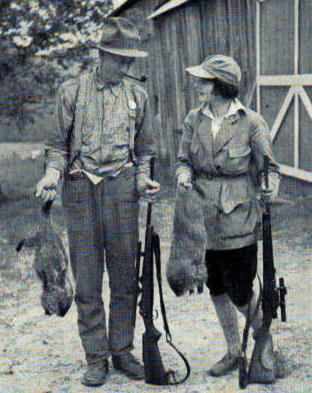

 The Accurate Reloading Forums
The Accurate Reloading Forums  THE ACCURATE RELOADING.COM FORUMS
THE ACCURATE RELOADING.COM FORUMS  Hunting
Hunting  Varmint Hunting
Varmint Hunting  P-Dogs OUT?
P-Dogs OUT?Go  | New  | Find  | Notify  | Tools  | Reply  |  |
| one of us |
Yah-ta-hey Tom, Nice to see someone from close to home posting on the net. I grew up close to Gallup. Used to shoot lots of p-dogs there too. | |||
|
| <thomas purdom> |
Yah-ta-hey gunsdogs. I really like this area. Twenty minutes out of town and either I am in the piney woods on Mount Taylor or in the Zuni Mountains, then you have the lava and limestone mix along State Highway 117. Yesterday I drove to Ramah to get out of Grants for a few moments and it was just beautiful. That Inscription Rock where the Conquestadors chizzled their names in it looking for the Seven Cities of Gold is just amazing. On the way to Ramah, before Inscription Rock I saw about 80 head of antelope and the elevation in that area is about 8,000 feet. About an hour before I was up in Bonita Canyon and saw elk track, coyote track, mule deer tracks and a bear track. I don't know how old the bear track was, though. And the hunting is good too! I am a reporter for the Gallup Independent. I run the Grants Bureau and have been here about six years now. Have a nice day and thanks for posting. Tom Purdom | ||
|
| one of us |
I know more about the White Tail PD than your AZ Black tail, (which some say the AZ black tail is a sub species of the black tail and most consider to be a species of their own). At any rate it is normal for adult males to come out in March, adults being two year olds and older. Nest out are the one year olds in Late April. The pregnant females are out a little but they come out for good in late May to early June with their young. This staggered wake up call matches the maturaty of their digestive systems. The old dudes eat rougher plants and seeds early. When the new born come out it is as good as it gets with all the tender new growth, They also stagger going backdown with thw one year olds staying out the longest. The above is general information. I once saw an old male on new years day. regards PDD | |||
|
| one of us |
Interesting bit of information I found in one of my Prairie Dog books. The reference was to scientific data that applied to both White-tailed Prairie Dogs and Black-tailed Prairie Dogs. Both species begin breeding when the average daily temperature (average temperature for a 24 hour day) reached 32 degrees Fahrenheit! The young would be born 28 to 32 days later and the young would appear above ground when the average daily temperature reached 55 degrees Fahrenheit! Prairie Dogs produce just one litte per year and the average litter size is 5 pups. The further north in the Prairie Dogs range the later in the year they become pregnant. I have seen Prairie Dogs out in Montana and Wyoming in November and December. Anytime the sun warms the ground (or the air or the snow they stand on?) they seem to come out for a look see! They apparently do not hibernate but do become "dormant" for varying periods of time. Hold into the wind VarmintGuy | |||
|
| <re5513> |
quote:Here in Colorado Springs I've noticed that a huge dog town 5 miles from my house certainly reflects the idea of dormancy with a good 2 1/2 feet of wet snow covering the whole town (from the recent Colorado Blizzard). After 5 days, still no dogs have busted through the snow. I supposed there just biding their time making little pups until the snow melts. | ||
|
| one of us |
I guess I'm going to expose a small portion of the vast breadth of my ignorance, but I didn't know they ever went dormant. Here in east central New Mexico they present themselves as targets of opportunity all year long. They will shade up in the heat of a summer day and shooting is better early morning and late afternoon but unless the weather is completely disagreeable they are out pretty much every day. | |||
|
| Powered by Social Strata |
| Please Wait. Your request is being processed... |
|

Visit our on-line store for AR Memorabilia

